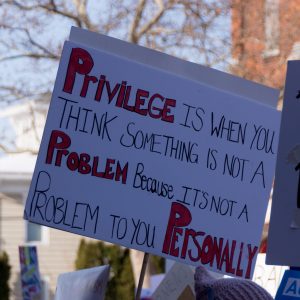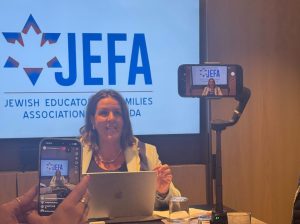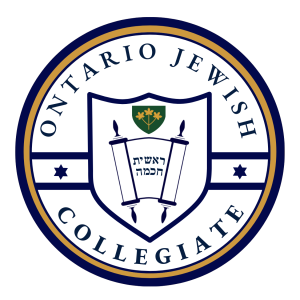 “You’re the only Jew I’ve ever met” is a phrase Alicia Krumholz has heard often at the University of Western Ontario (UWO).
“You’re the only Jew I’ve ever met” is a phrase Alicia Krumholz has heard often at the University of Western Ontario (UWO).
From left, Bianca Canave, Hanaa Alaubaid and Alicia Krumholz participated in the third annual Abrahamic road trip in London, which teaches participants about Judaism, Christianity and Islam.
This is one of the reasons that she participated in the university’s third annual Abrahamic road trip last week. The road trip, which is hosted by the Centre for Catholic-Jewish Learning at King’s University College at UWO, takes students to a Jewish, Muslim and Catholic centre, where they hear from representatives of each community.
The trip, which was free to all students and had more than 35 participants, was created to help dispel religious stereotypes and educate students about different cultures and faiths.
For Krumholz, a fourth-year religious studies and geography student, the event is a chance to both ask and answer questions.
“There are a lot of things out there to believe [about Judaism]. If you take everything at face value… that’s dangerous,” she said.
“This is my second year going… I feel like this is a great thing. What I’ve learned in religion is that there are really more similarities [than differences] between the three Abrahamic religions,” she said, adding that the trip helped explain some Jewish values and misconceptions.
“History teaches us that Jews have suffered a lot of persecution. It’s important to get an accurate portrayal of what a Jew is like.”
This is one of the Centre for Catholic-Jewish Learning’s goals, said Andrea Rector, the centre’s secretary.
“I think everyone’s recognizing that we’re living in an increasingly globalized society and it’s becoming more and more difficult to live in our isolated societies,” she said, adding that the centre will be changing its name to the Centre for Catholic, Jewish and Muslim Learning in September.
“It’s very important to us that people don’t use religion… as a reason for conflict, and particularly for discriminating against one another. The goal is to increase people’s knowledge, compassion and understanding,” she said.
This year, the theme of the trip was women and faith, meaning that participants spoke to female leaders in the three religions, said Bianca Canave, one of the event’s founders and a fourth-year religious studies student.
“We knew that… it would be best if we had women in the faith speak… because there are a lot of misconceptions about women in most orthodox religions, [such as] that they don’t have as much of a role,” she said.
Canave, who is Roman Catholic, sees the road trip as a unique learning experience.
“Students have lectures five times a week. The good thing about this is that it’s fun and we only spend about 40 minutes at each place. Students leave wanting to hear more,” she said.
For Canave, interfaith events like the road trip are crucial for university students.
“I think it’s important for everyone to learn about the people that you interact with every day. There are a lot of students who went to [Jewish day schools] and only had Jewish friends. It’s really nice to see how much they learn about [other religions],” she said.
Hanaa Alaubaid, another trip founder and participant, agrees.
“I feel like there’s a lot of misconceptions about Islam and Judaism where people are mixing the cultures with religion,” Alaubaid, who is Muslim and a fourth year religious studies and English student, said, adding that a road trip is a good forum for interfaith interaction.
“You get on a school bus with random people… and you’re taught [about] religion. It’s a completely different experience,” she said.






